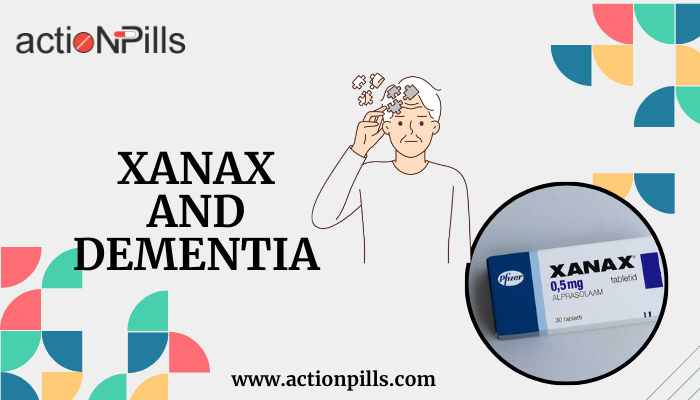For mental disorder treatment, doctors or healthcare experts prescribe benzodiazepine medicines like Ativan, Valium, and Xanax. These medications are very helpful for anxiety, panic attacks, insomnia, and other health problems. However, Long-term use can increase the risk of side effects including Dementia. This problem occurs in senior citizens. Today we explore the relationship between Xanax And Dementia, does Xanax cause Alzheimer’s or dementia?
Xanax Dementia Relation
Before discussing the link between Xanax and Dementia, First, we need to know what is Xanax and what is Dementia. It will help us to understand these two substances.
- Dementia– Dementia is a group of symptoms that occur when a person loses cognitive abilities, such as memory, thinking, reasoning, and behavior. These can interfere with a person’s daily life. These symptoms are caused by various diseases and conditions, with the most common cause being Alzheimer’s disease.
- Xanax- Xanax (alprazolam) is an anti-anxiety medicine belonging to the benzodiazepine family. It helps to treat anxiety and panic disorders. This medicine works by increasing the activity of GABA in the brain which can create a calming effect. In the market different types of benzodiazepine are available. But doctors mostly prescribe Ativan, Valium, Klonopin, and Xanax.
There is very little evidence who prove that Xanax causes Dementia. The relationship between Xanax (alprazolam) and dementia is a complex and debated topic. Some studies and experts say that long-term benzodiazepine use, including Ativan and Xanax, can increase the risk of cognitive decline, dementia, and Alzheimer’s disease. However, the evidence is not enough or conclusive. Now we look at why people say “Can Xanax cause dementia”.
Does Alprazolam cause Dementia?
Benzodiazepines like Xanax can have sedative and cognitive impairing effects, which may contribute to memory and cognitive problems. However, these effects are more pronounced in older adults and individuals with pre-existing cognitive impairment.
Other factors like age, underlying health conditions, genetics, substance abuse, and lifestyle choices can be responsible for the development of dementia. It is challenging to determine whether Xanax plays an important role or if people using this medication are already at a higher risk of dementia due to these other factors. Valium vs Xanax, Xanax is the best medication for anxiety but together they increase Dementia risk by 50 Percent.
If you are concerned about the potential impact of Xanax on Dementia, then consult with your doctor or healthcare professional. They can check your conditions, guide best medication to use, and discuss alternative treatment options if necessary.
Drug Warning: Xanax And Dementia
Here we try to give information related to other drugs that you need to avoid because they may affect memory and thinking, can cause problematic side effects, or other problems.
- Anxiety- If a person suffers from anxiety, they can use Benzodiazepine antianxiety drugs. We should avoid Ativan, Klonopin, Restoril, Librium, Xanax, and Hydroxyzine (anticholinergic medications). Because they can create confusion and increase your risk of falls.
- Insomnia- In this state, you must avoid diphenhydramine-containing products like Benadryl, Tylenol, and Advil. Never mix sleep medicine with other medicines example Ambien and Xanax, because they increase certain side effects which lead to blurred vision, and dizziness.
- Depression– Antidepressants have anticholinergic properties which can worsen your memory, and thinking power. These medicines also impact the effectiveness of memory medications. A list of these medicines are Paxil, Elavil, Pamelor, Aventyl, Norpramin, and Tofranil.
Ask your doctor about all the medicines listed which you may be careful of because they can cause serious consequences.
Xanax For Dementia
FDA does not approve Xanax medication for dementia. When a patient’s symptoms become increasingly difficult and stressful to manage, many doctors often prescribe it (Xanax- off-label) to treat some of the symptoms such as anxiety and insomnia.
While Xanax may briefly alleviate some symptoms of agitation and anxiety-related behaviors in patients with dementia, it is generally not recommended as a long-term treatment. This is due to several factors such as cognitive impairment, side effects, dependency, and tolerance
- Side effects: Xanax can cause drowsiness, confusion, dizziness, and impaired coordination, which can increase the risk of falls and injuries in older individuals with dementia.
- Dependency and tolerance: Benzodiazepines like Xanax have the potential for misuse, dependency, and tolerance, especially when used for an extended period. This can lead to withdrawal symptoms when the medication is stopped or decreased.
- Cognitive impairment: Dementia already affects cognitive functioning, and the use of Xanax can further impair memory, attention, and problem-solving abilities.
Never take xanax without a doctor’s or health care expert’s permission. After checking all of your condition they may recommend this medication to you. If you suffer any problem after taking these medicines then immediately call your doctor. So, they can evaluate your risk factors and determine the most suitable treatment options for your condition.
Bottom Line:
There is currently no cure for dementia, but certain medications like Xanax can help manage symptoms and slow down the progression of the disease in some cases. But this is only possible under the guidance of your doctor or healthcare expert. Because Xanax has a sedative effect and prolonged use of this medicine can cause cognitive impairment. In dementia cases, it increases the risk of memory loss. To avoid these side effects, talk to your doctor or healthcare expert about suitable treatments that might be safer for your condition.
The important point is that when you stop taking these medicines it can start to reduce symptoms. Providing a supportive and stimulating environment, maintaining a healthy lifestyle, and engaging in activities that promote mental stimulation can also be beneficial for patients with dementia.
We hope that this topic might be helpful to you. For more information visit our site. If you have any queries related to this then contact us
